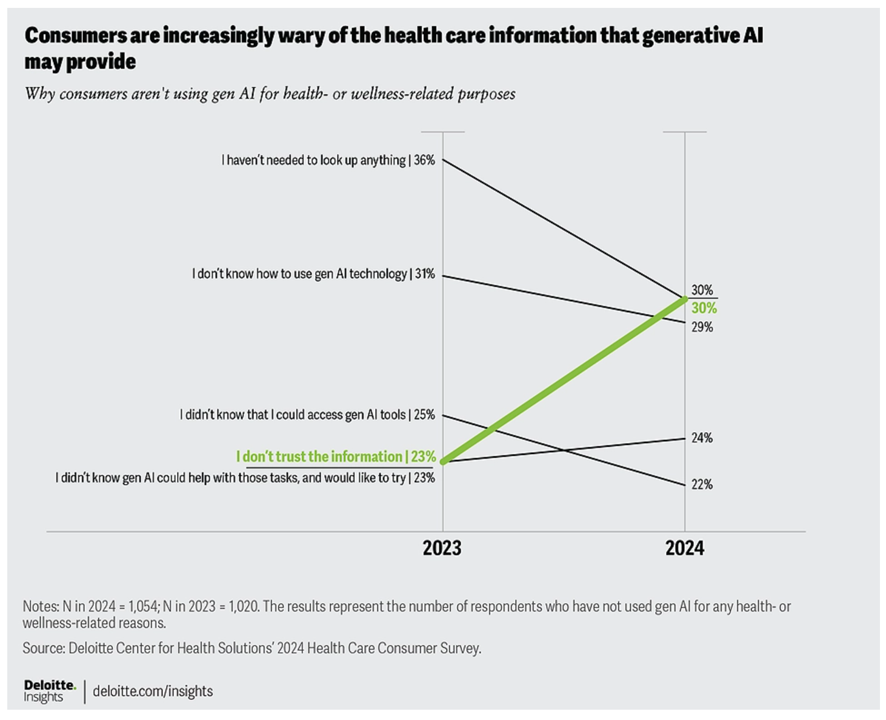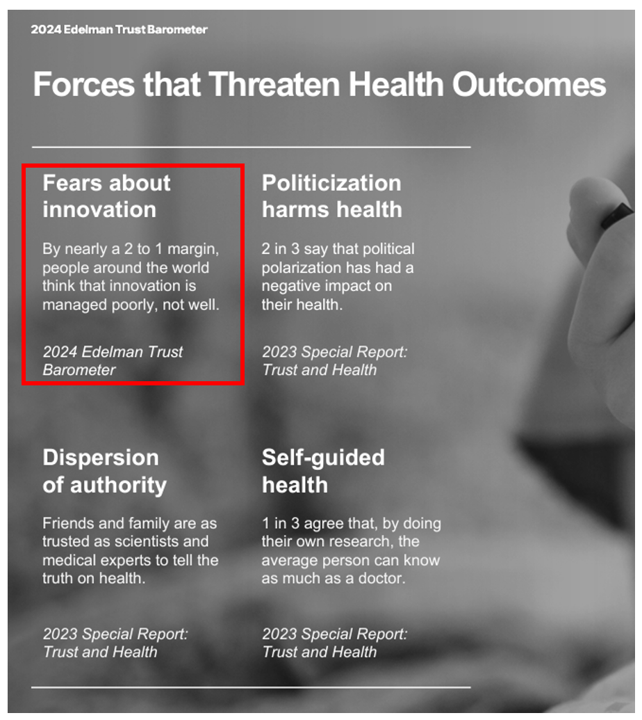If people’s feelings about AI were a Wall Street market, we’d find both bulls and bears, simultaneously, viewing AI’s role in health care. We can see this from many consumer surveys published in the past year about the growing role and adoption of AI in health care, and some wariness found in a new study from Deloitte on Building and maintaining health care consumers’ trust in generative AI.

Here’s the top-line from the Deloitte team, with particular growth in the question of trusting the information forming the AI for health or wellness related purposes — the bold avocado green line.
We see that in 2024, 30% of U.S. consumers said the don’t trust the information enough to use GenAI for health or wellness purposes compared with 23% who didn’t trust the data in 2023 — those 7 percentage points representing a 30% “skepticism” growth.
Also, the proportion of people saying they haven’t needed to look up anything using GenAI for health dropped from 36% to 30%, and those who said they didn’t know how to use GenAI technology falling a bit from 31% to 29% in the year.
About 1 in 4 people in the U.S. would “like to try” using GenAI for personal health and wellness tasks, fairly flat between 2023 and 2024.

To address how health care leaders could more effectively implement GenAI in health care, Deloitte offers some focus areas that might prove useful. Overall, Deloitte recommends health care leaders “broad priorities” when scaling GenAI, focusing on various issues with concerns about the data (such as security and privacy issues and mitigating biases), the workforce (upskilling staff, for example, as well as being attentive to shifting job roles and workforce concerns), and consumer-facing challenges which require patient education and transparency about AI. 
Health Populi’s Hot Points: In 2024, most consumers globally have a fear about innovation being managed poorly, and AI is a major technology component playing into that fear, according to the 2024 Edelman Trust Barometer’s health consumer survey data.
Edelman’s annual Trust Barometer identified erosion in consumers’ trust in government, media, and NGO’s for the past several years — and in the past year, more erosion in trust with the health care industry overall and for some segments for some people, more risk aversion — such as with life sciences businesses that market products based on research. This sentiment is going well beyond the pre-COVID anti-vax movement, which was exacerbated during the pandemic in a variety of ways and via a variety of channels (media and social).

That concern about the data that AI “eats” and requires for its statistical analytic life-blood was also raised in a new consumer survey into Gen AI and healthcare from Wolters Kluwer.
The graphic from Wolters Kluwer’s report gives us several data points painting a picture of concern — such as 86% of U.S. consumers saying not knowing where the information came from and how it was validated is a problem.
Similarly, 4 in 5 people would be more comfortable with the use of AI in health care if they knew the company behind the GenAI had a long track record in the healthcare industry, and also would favor medical specialists being involved in creating the GenAI source content.
I’ll be exploring the challenge of trust in health care on Thursday 13th June with a panel of folks who well understand this issue including Dr. Geeta Nayyar, Dr Garth Graham, Dr. Reed Tuckson, and Dr. David Brailer. If you’re attending AHIP 2024 in Las Vegas, please come to our session on 13th June at 930 am in the Lafite Ballroom. Hope to see you there for the brainstorm!




 Interviewed live on BNN Bloomberg (Canada) on the market for GLP-1 drugs for weight loss and their impact on both the health care system and consumer goods and services -- notably, food, nutrition, retail health, gyms, and other sectors.
Interviewed live on BNN Bloomberg (Canada) on the market for GLP-1 drugs for weight loss and their impact on both the health care system and consumer goods and services -- notably, food, nutrition, retail health, gyms, and other sectors. Thank you, Feedspot, for
Thank you, Feedspot, for  As you may know, I have been splitting work- and living-time between the U.S. and the E.U., most recently living in and working from Brussels. In the month of September 2024, I'll be splitting time between London and other parts of the U.K., and Italy where I'll be working with clients on consumer health, self-care and home care focused on food-as-medicine, digital health, business and scenario planning for the future...
As you may know, I have been splitting work- and living-time between the U.S. and the E.U., most recently living in and working from Brussels. In the month of September 2024, I'll be splitting time between London and other parts of the U.K., and Italy where I'll be working with clients on consumer health, self-care and home care focused on food-as-medicine, digital health, business and scenario planning for the future...